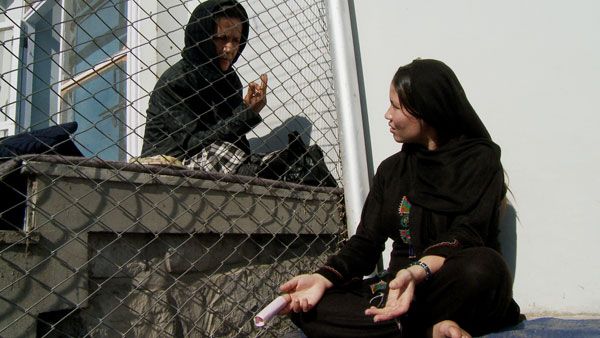"Love Crimes of Kabul"
A new HBO documentary goes inside Afghanistan's Badam Bagh prison to profile women serving time for "moral crimes"

If you're a regular MC reader, you know how strongly we feel about reporting on and getting involved with women's issues in Afghanistan. A few months back, Karen Day wrote about women in that country imprisoned for "moral crimes" such as leaving an abusive husband.
Now a new documentary debuting tonight on HBO takes you inside the Badam Bagh women's prison to tell the stories of three women: Kareema, 20, who turned herself and her boyfriend in to authorities after she got pregnant and he refused to marry her; Aleema, 22, who ran away from her violent home who ended up in the home of a woman who then tried to sell her; and Sabereh, 18, who was turned in by her father for fooling around with a boy in a closet.
What I found most poignant about American filmmaker Tanaz Eshaghian's documentary are the similarities you can find between these three women and myself, or other women I know. It's hard to imagine—seeing as we live in a country where people get rich and famous for having sex tapes—that girls like Sabereh (whose virginity is proven by a doctor) are sitting in jail for getting physical with a boy. And yet, the emotions are the same. Kareema seems lovesick over a man who doesn't seem to care about her half as much as she does him. Aleema is the headstrong one, looking to fight the system at every opportunity. And Sabereh, the innocent child, who even the prison guards seem to rally around.
One of the female prison officials says the jails are too full because women have been given too much freedom. This is too much? Can you even imagine? And this is why it's all the more important that we watch films like Love Crimes in Kabul and learn these women's stories and hear their voices.
I won't give away the ending, but I think you'll be surprised and saddened by how it all turns out for these women. Watch and come back to tell us what you think.
Love Crimes of Kabul, HBO, July 11 9PM EST
Want to help? Purchase a "Not Guilty" T-shirt to support the Afghan Women's Justice Project.
Get exclusive access to fashion and beauty trends, hot-off-the-press celebrity news, and more.